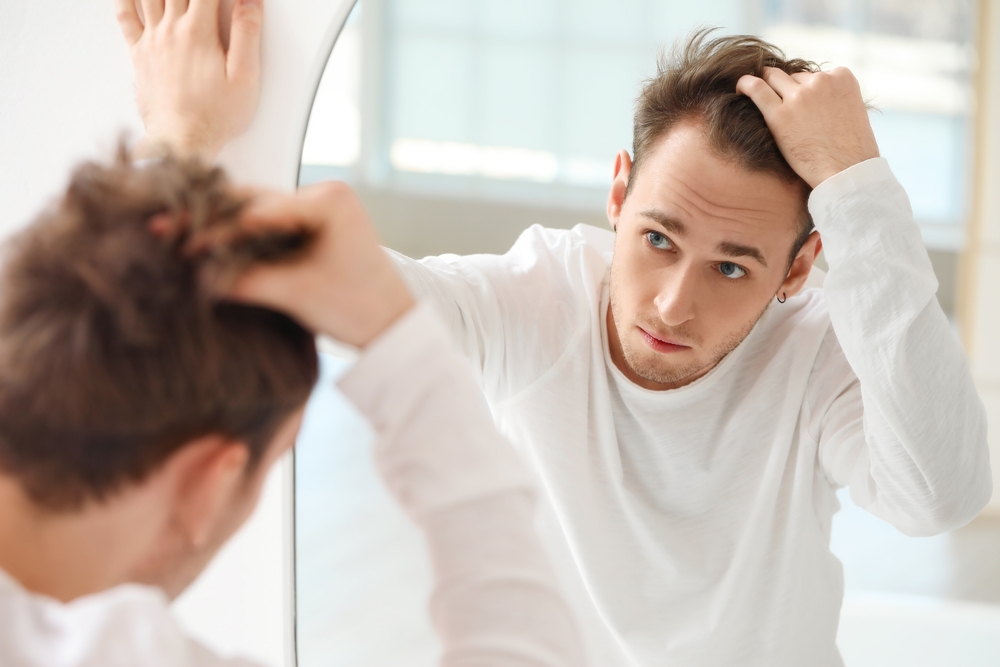Over recent months, the use of creatine, a widely popular pre-workout supplement, has sparked discussions due to its potential link to hair loss. While it has not been proven to cause hair loss, some data shows that creatine may impact DHT levels, a hormone linked to hair thinning and loss.
What is Creatine
Creatine is a protein compound found naturally in the body, mostly generated by the liver, kidneys, and pancreas. It serves as an essential source of energy for cells, particularly those in skeletal muscles. Creatine is stored in the form of phosphocreatine, which is broken down during physical activity to generate energy for muscle contractions. In addition to being produced by the body, creatine is also present in red meat and fish.
Creatine supplements are available in several forms, including powders, liquids, and pills. Athletes and fitness enthusiasts often use creatine supplements to increase muscle mass and improve athletic performance. By boosting the amount of creatine available in muscles, the body can generate more energy during high-intensity activities, potentially enhancing overall performance.
Does Creatine Cause Hair Loss
One of the key concerns related to creatine supplementation is does creatine cause hair loss. To understand this, it’s essential to explore how creatine may influence DHT (dihydrotestosterone), a hormone derived from testosterone. DHT is known to attach to certain receptors in hair follicles, which might delay the hair development cycle and result in thinner, weaker hair. The impact of DHT on hair is largely dictated by genetic predisposition, meaning some individuals are more susceptible to hair loss than others.
Does Creatine Increase DHT Levels
Several studies have demonstrated that creatine can raise DHT levels. For example, a study involving college-aged rugby players found that supplementing with creatine over three weeks led to a significant increase in DHT levels. The DHT-to-testosterone ratio rose by 56% after one week of supplementation and remained 40% above the baseline after two weeks. However, it is important to note that while the study showed an increase in DHT, it did not directly assess hair loss among participants.
While some individuals may be genetically predisposed to hair loss, creatine could act as a catalyst for androgenetic alopecia if increased DHT levels contribute to hair follicle miniaturisation. However, there is still limited research to conclusively link creatine supplementation to hair loss, and further studies are needed to establish any direct correlation.
How to Address Hair Loss If You Think You Are Affected by Creatine
If you believe that creatine supplementation is contributing to hair loss, consider monitoring your hair health closely. Hair shedding due to DHT elevation may start approximately two months after beginning supplementation. If hair loss becomes noticeable, discontinuing the use of creatine could potentially help. Stopping supplementation allows you to observe whether your hair growth stabilises or improves over time.
In some cases, creatine may not directly cause hair loss but could accelerate hair thinning in individuals with a predisposition to androgenic alopecia or other genetic conditions. Consulting with a healthcare professional or dermatologist can provide further guidance on whether creatine is the cause and recommend suitable treatment options.
Can You Avoid Hair Loss While Taking Creatine
Preventing hair loss while taking creatine supplements is challenging due to the limited evidence connecting creatine to hair thinning. However, if you are concerned about the potential for increased DHT levels and hair loss, it may be best to avoid creatine or consider alternative supplements. Prioritising a healthy diet and maintaining proper hydration can also support hair health.
The Impact of Smoking on Hair Health
The relationship between smoking cigarettes and hair loss is widely known. Cigarette smoke contains chemicals that can harm hair follicles, reduce blood circulation to the scalp, and eventually lead to hair loss and balding. When hair follicles do not receive adequate oxygen and essential nutrients due to reduced blood flow, hair health can deteriorate.
Smoking can also lead to oxidative stress, which damages cells and accelerates the ageing process. The likelihood of hair loss increases if this damage spreads to the hair follicles.
Does Vaping Cause Hair Loss Similarly
Alongside creatine, vaping or smoking e-cigarettes has raised a concern as to does vaping cause hair loss. It has become a topic of discussion regarding its effects on hair health. While vaping is often perceived as a safer alternative to smoking traditional cigarettes, emerging research suggests that vaping can also contribute to hair loss.
Although vaping has not been studied as extensively as traditional smoking, preliminary findings indicate that vaping may have similar effects on hair health. Many e-cigarettes contain nicotine and other chemicals, which can potentially affect hair follicles and lead to hair thinning. Like cigarette smoking, vaping can constrict blood vessels, reducing blood flow and nutrient delivery to the scalp. This reduction in blood circulation can make hair follicles weaker and more susceptible to damage, contributing to hair loss over time.
How Vaping Affects Your Body and Hair
E-cigarettes are designed to deliver nicotine to the body, which is rapidly transported through the bloodstream after inhalation. Each time you vape, between 1 and 15 milligrams of nicotine may enter your system. Nicotine constricts blood vessels, leading to reduced blood flow to hair follicles. Repeated exposure to nicotine means that hair follicles may receive less oxygen and fewer nutrients, which are essential for healthy hair growth.
Prolonged use of vaping devices can also lead to increased risk of health issues such as lung injuries and heart problems. Although there is no definitive evidence that vaping liquids cause hair loss, the presence of certain chemicals may result in hair thinning and loss over time.
What Can You Do to Reduce the Risk of Hair Loss from Vaping
The most effective way to reduce the risk of hair loss related to vaping is to quit using e-cigarettes altogether. Opting for alternatives such as nicotine patches or gum can help manage nicotine cravings without exposing the body to the additional chemicals found in vape liquids. These alternatives are typically associated with fewer health risks and can support better blood circulation, promoting overall hair health.
For individuals struggling with hair regrowth after quitting smoking or vaping, treatments such as PRP (Platelet-Rich Plasma) therapy or hair transplants may be options to consider. Consulting with hair specialists or healthcare providers can help determine the best course of action for restoring hair health.
Conclusion
Both creatine supplementation and vaping have potential implications for hair health, with creatine potentially elevating DHT levels and vaping possibly affecting blood circulation and nutrient delivery to hair follicles. While definitive evidence linking either to significant hair loss is limited, it is crucial to be mindful of any changes in hair health when using these substances. If you suspect that your hair loss is related to creatine or vaping, discontinuing use and seeking advice from healthcare professionals can help.
At Zestige Private Healthcare, we are dedicated to providing personalised guidance and support for your health and wellness needs.




